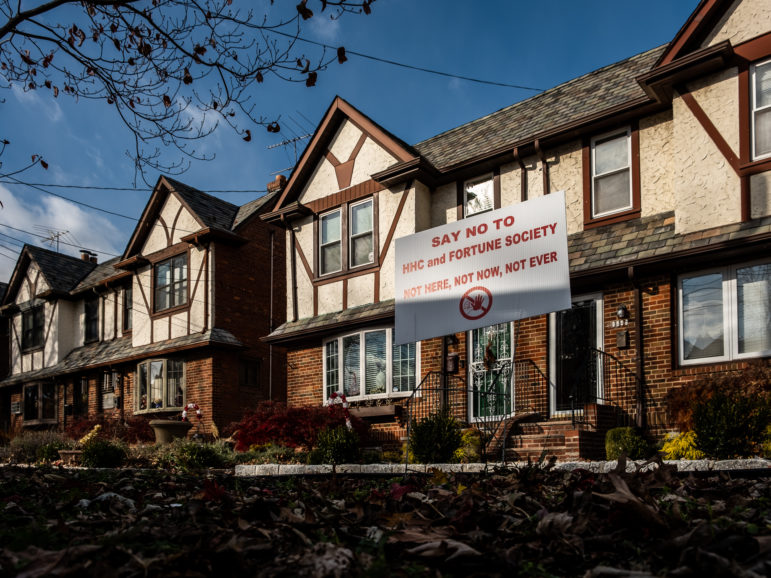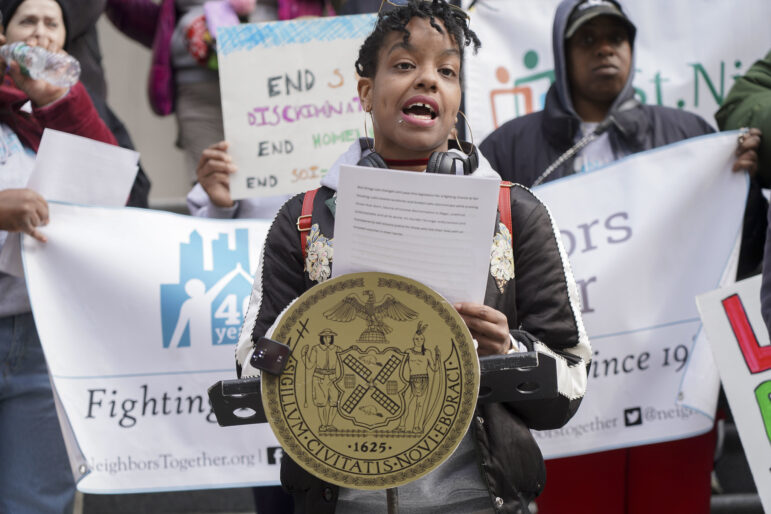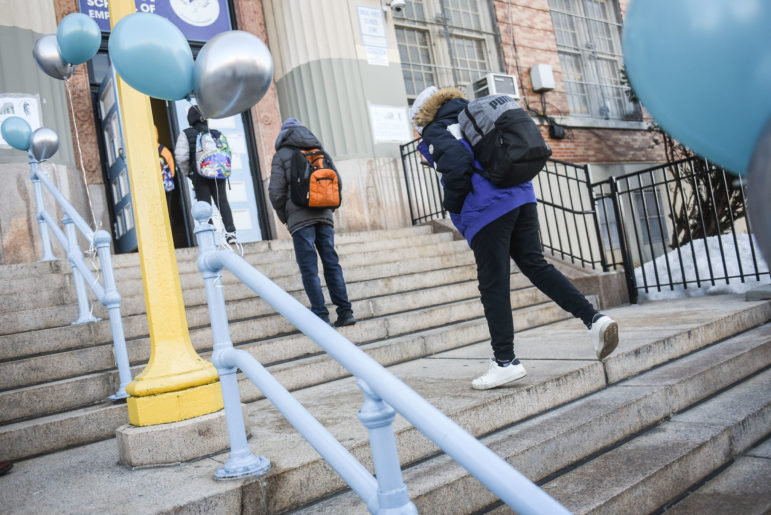Election Special: News from the neighborhoods
State legislative primaries are this Tuesday, and there is both not much and a lot at stake. Not much because turnout is expected to be low and most incumbents are not facing serious challenges. And a lot because New York State currently has, according to the Brennan Center for Justice, the most dysfunctional state legislature in the nation–making every possibility for positive change a precious one. We’ve turned to community newspaper and freelance reporters for the view from the neighborhoods
North Bronx: Muck Flies Over Water Filter Plant
Water seems to be thicker than party in the Democratic primary for the 34th District State Senate seat. That’s the spot Republican Guy Velella vacated before he pleaded guilty to bribery charges this spring.
The water is the Croton Filtration plant, slated to be built under the golf course at the eastern edge of Van Cortlandt Park. The two major candidates in the Democratic primary, Assemblymembers Stephen Kaufman and Jeff Klein, both supported the project last year when it came before the Assembly. Klein was also able to stop the construction of the plant at a possible alternative site, the Jerome Park Reservoir. They both made sure to tout to constituents the benefit they’d be getting in return: $200 million in new city money for Bronx parks.
But the water filtration plant faces intense community opposition, and early in this summer’s campaign, Klein became one of the project’s harshest critics, saying he would back lawsuits against it. Kaufman stayed steadfast in support of the plan.
This is where party comes in. Kaufman is running as a Democrat, Republican, Conservative and Independent, and most Democrats assert he’s part of an effort by state Republicans to hold on to their control of the Senate. He’s received money from Mayor Bloomberg, two Bush Pioneers and MTA Chair Peter Kalikow. Klein is just a Democrat.
He’s been supported by the Bronx Democratic machine and some marquee statewide names. But two prominent Riverdale Democrats and longtime Klein rivals–Assemblymember Jeff Dinowitz and Congressman Eliot Engel–bucked the Democrats to back Kaufman.
Both Dinowitz and Kaufman are now assaulting Klein for his newfound opposition to the filtration plant. Taking a page from the Republican playbook, Kaufman says Klein lacks character and is a flip-flopper.
–Evan Weinberger
The Riverdale Press
…and Boss Babies Face an Activist Challenge
Meanwhile, the progeny of two Democratic leaders–former Democratic chair George Friedman and current boss Jose Rivera–are vying to replace Jeff Klein in the Assembly. Both Anthony Friedman and Naomi Rivera came out of the woodwork; neither was previously known as an activist in the district.
Rivera, who most recently worked for the Bronx County Board of Elections, grew up on Long Island. After being hit hard by Friedman in a recent debate for being beholden to the Democratic machine, Rivera insisted she was independent. All the while the elder Rivera and Friedman sat in the last row of church pews, across the aisle from each other.
Perhaps lost in the media-friendly story line of boss v. boss is seasoned activist Joseph Thompson, a former police officer well known in the Morris Park/Pelham Parkway section of the district for his community work. Thompson has the least money, but he does have committed volunteers hitting the streets.
Few issues, if any, separate the Democratic candidates. All oppose the filtration plant planned for Van Cortlandt Park–though Rivera’s stand drew the most notice since her dad was the architect of the deal to put it there. It was most likely not a difficult decision to make: The Assembly and Senate have already okayed the plan, and the City Council will probably seal the deal before month’s end.
–Jordan Moss
Norwood News
North Brooklyn: Getting Out the Hipster Vote
Stop a Williamsburg resident and ask about any pressing social question. You’re likely to get a left-leaning answer, if not a 10-minute Marxist polemic. Now ask about their Councilperson or local voter registration status, and you’ll get blank stares. But that hasn’t stopped Ron Clinton, a community activist running for State Senate in Tuesday’s primary, from betting on these neighborhood newcomers to put his campaign over the top.
Clinton faces incumbent politician Martin Malave Dilan in a district that encompasses Greenpoint, Bushwick, Williamsburg and East New York. While Dilan has big-name backers including Assemblymember Vito Lopez, Clinton has an unusual approach to inspiring new voters. “There’s a spirit in Williamsburg, but it’s focused on national issues,” Clinton said. “We have to connect those feelings to local issues and local politics.”
His well-designed literature touts slogans like “The Movement Begins,” and “Live Here? Vote Here.” After a spirited voter registration drive, the campaign moved on to pub crawls and traveling art exhibits, promoted along ultra-hip Bedford Avenue. At some of Billyburg’s most popular watering holes–Iona, Union Pool, Yabby and the East River Bar–Clinton mingled with the masses, engaging them with hot-button issues. The proposed power plant? He’s against it, for environmental and water access reasons. New waterfront housing? As long as it preserves the neighborhood character and provides for affordable housing. But the real message was that this local politician knows that locals love Union Pool, and that he bothered to go there.
In the last State Senate primary, only 2.3 percent of the district’s registered Democrats voted. To improve voter turnout this time around, Clinton is going beyond Williamburg, reaching out to Bushwick, Greenpoint and East New York with more traditional tactics.
Dilan’s campaign isn’t particularly worried about Clinton’s approach. “Senator Dilan has worked closely with newcomers to the neighborhoods, who actually have very similar concerns as other residents,” said Sam Schaeffer, spokesperson for the campaign. “I don’t think it’s really a concern that they’re going to be creating a whole new block of new voters. It’s not necessarily theirs to have.”
–Phil Andrews
Brooklyn
Nassau: Suozzi Stirs it Up
The North Shore of Long Island isn’t usually where one goes for excitement, but a Democratic primary there Tuesday is the first battle in Tom Suozzi’s campaign to reform state government. In fact, Suozzi is probably more important in this race than the challenger he is backing, Charles Lavine, or the incumbent, David Sidikman. In March, Suozzi, the county executive, formed a political action committee called Fix Albany, and announced that his modus operandi would be to defeat entrenched state legislators.
Sidikman, a 12-year incumbent who hasn’t gotten Newsday’s endorsement since 1994, was chosen as the sacrificial lamb. “Tom asked Sidikman to support a reform platform and to see that one is enacted and Sidikman did not give him a commitment,” says Jay Jacobs, chairman of the Nassau County Democratic Party and a friend of Suozzi. Sidikman denies the conversation ever took place and argues that he’s been reforming Albany all along. Unions and fellow assembly members, including Steven Sanders of Manhattan, are putting their cash behind Sidikman, who raised $100,000 from January to late August. Lavine, a councilmember from Glen Cove, collected $75,000 in a mere three months of being a candidate. He’s also picked up endorsements from Newsday and The New York Times, which were unabashed to state this race is not about the candidates. It’s about Albany.
–Matthew Schuerman
Crown Heights
Northern Queens: Race Reconsidered
In Flushing, one of the most heavily Asian districts in the city, Councilmember John Liu had a difficult choice to make: support a longtime Flushing ally or help improve Asian representation in the State Assembly.
Liu, the first and only Asian member of the City Council, is backing incumbent Barry Grodenchik for the 22nd Assembly District Democratic party primary rather than Chinese candidate Jimmy Meng, a local lumber yard owner. Meng is nonetheless a serious contender–he lost by only 152 votes in the 2002 primary.
In downtown Flushing, where Chinese-language signs, restaurants and retailers dominate, some locals argue that identity is everything. “This is an Asian-sensitive seat,” said Ethel Chen, a Meng supporter and district leader candidate, at a recent event.
But Liu disagrees. “That’s actually the biggest thing about Meng that disturbs me,” Liu said, when asked why he was not supporting a fellow Asian-American candidate. “It’s his appeal for people to vote for him because he’s Asian and it’s an Asian district.”
Liu feels that he and Grodenchik have a more compatible vision for Flushing, with similar stances on clean-up, development and transportation.
Also running in Tuesday’s primary is Benjamin Singer, a longtime Flushing businessman, who has gained the support of longtime Flushing councilmember Julia Harrison, Liu’s predecessor. All three candidates have prioritized quality of life in Flushing as their top concern. They want to improve sanitation on Main Street and add more parking to the area in order to attract more businesses and consumers. What differentiates them most are their backgrounds.
Local community board chair Gene Kelty said he hopes voters stay focused on the issues, rather than race.
“I don’t like the race card,” he said. “He’ll be the first Asian person in Albany, but what the hell does that have to do with it?”
–Cynthia Koons
Times-Ledger
South Brooklyn: Russians Rush In
Incumbents like Assemblywoman Adele Cohen almost never lose primaries in New York City, especially to under-funded neophytes like Inna Kaminsky, 27, of Coney Island. Yet Cohen, having edged Susan Lasher by about 200 votes in the 2002 primary despite outspending her by more than four to one, can’t take the Odessa émigré for granted this September 14.
Cohen’s problem is that many Russians, a growing political force in the Brighton Beach end of the 46th Assembly District, dislike her. She traces the problem to a Russian newspaper article that she said falsely accused her of demeaning Russians. Others say Cohen alienated some Russians with her gruff manner.
But support for Cohen among her non-Russian constituents (particularly in Bay Ridge and Dyker Heights) was enough to reelect her two years ago. So Tuesday’s election could hinge on which community turns out in the greatest numbers.
Bad blood runs thick in the 46th. Kaminsky, running with help from Lasher, says Cohen suppressed the Russian vote in 2002 by having the Board of Elections move three key polling sites and employ her supporters as poll inspectors. Cohen claims she works hard to serve Russians yet has been viciously defamed by them. “I think I have an enemy problem,” she said.
The Kaminsky campaign, run by Gary Tilzer and attorney Alan Rocoff, veterans of Brooklyn politics, has asked the Justice Department to guarantee a fair election.
The candidates have little in common. Cohen, a grandmother, was a Democratic state committeewoman and union organizer before joining the Legislature. Kaminsky is a young mother, foreign-born and new to politics. Cohen has reported $46,000 in campaign expenses this year, Kaminsky none. Cohen is known for her sharp tongue, while Kaminsky, before this summer, was entirely unknown.
They do share a penchant for campaigning: Cohen was once described as “Robo-Candidate” by Rep. Anthony Weiner for her relentless door-to-door style, while Kaminsky has been staking out the Boardwalk for months.
The winner will have to keep at it through November 2. Though the district is heavily Democratic, the Republican-Conservative Alexander Kaplan is considered a strong candidate. He, too, is Russian-born.
–Erik Engquist
Brooklyn Courier-Life newspapers








